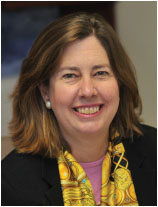It was not supposed to happen like this.
When Tracy was diagnosed with stage II ovarian cancer in June 2009, she was devastated. But the 47-year-old mother of two barely had a chance to breathe before she plunged headfirst into aggressive treatment. Just a month after her diagnosis, Tracy underwent a complete hysterectomy, followed by another surgery and several rounds of chemo.
Tracy was exhausted, terrified—and angry. Her normally calm and optimistic demeanor gave way to a person she didn’t recognize. She burst into fits of rage, had trouble sleeping, and felt a constant, crushing anxiety simmering beneath the surface. Her thoughts raced. What did I do to deserve this? Why is this happening to me? This is not how my life was supposed to unfold. It was not supposed to turn out like this.
Tracy’s health care team encouraged her to seek professional counseling to help her cope with the drastic changes that had overtaken her life in such a short time. Because of the physical toll of her surgeries and treatment, however, just getting out of the house was a major challenge. One of the nurses at the hospital where she was treated suggested getting counseling over the telephone and gave her a toll-free number to call.
Tracy reached the L’Oreal Paris OCRF (Ovarian Cancer Research Fund) Hopeline, a free telephone counseling and referral service launched through a partnership between L’Oréal Paris; its charitable partner, the Ovarian Cancer Research Fund (OCRF); and CancerCare, a national nonprofit organization that provides free counseling and educational services to individuals and families affected by cancer.
Cancer is without a doubt the biggest crisis a person can face—it affects all aspects of a person’s life. Concerns may be practical (“Where do I go for my care?”), medical (“How will I deal with the side effects?”), emotional (“How am I going to help my loved ones get through this?”), or spiritual (“Why is this happening to me?”). Patients need answers when they need answers; and they need support that goes beyond medical care, which their primary health care team can’t always provide. An interdisciplinary approach to treatment, with oncology nurses and oncology social workers working in tandem, along with individualized support from helplines, can provide patients with better care and support.
Calling the helpline was a life-changing first step to regaining a sense of control over her life, says Tracy. During her conversations with an oncology social worker who specializes in ovarian cancer, Tracy discussed her treatment and its impact on her children, as well as on the family’s finances. She noted that while she had a strong support group composed of family and friends, what she really needed was an outside person with whom she could share her feelings, and her anger, without reservation.
“Getting answers to my questions from someone who understands what I’m going through was a big help,” says Tracy.
Aside from seeking individualized counseling from the helplines, most patients also call for assistance in obtaining financial support to cover costs associated with their treatment. Expenses like transportation, homecare, and childcare can be a huge drain on finances. And, as the costs of many cancer therapies have risen, so too have insurance co-payments. Too many patients simply cannot afford to pay the hundreds or even thousands of dollars every month from their own pockets to cover the co-payments for their treatment, which presents a formidable obstacle to care.
This is where working with an oncology social worker can make all the difference. Nancy, a mother of three who was diagnosed with a malignant brain tumor in 2009, received a $10,000 grant to help cover the high cost of her insurance co-payments through the CancerCare Co-Payment Assistance Foundation, which was established in 2007 to address the needs of those who cannot afford their insurance co-payments to cover the cost of medications for treating cancer. The foundation provides eligible persons with up to $10,000 per year in co-payment assistance.
The CancerCare general information helpline (800-813-HOPE [4673]) is the focal point through which patients are able to access counseling, information, and related support services via telephone, completely free of charge. Professional oncology social workers provide support and resources to meet a wide variety of patient needs, from individualized counseling to educational materials to financial support.
In addition to its partnership with The L’Oreal Paris OCRF Hopeline (877-OV-HOPE-1 [877-684-6731]), CancerCare operates two other specialized helplines tailored to patients’ needs:
The Triple-Negative Breast Cancer Helpline, currently the only helpline for patients with triple-negative breast cancer that is completely staffed by licensed professional social workers: 877-880-TNBC (877-880-8622)
The Melanoma Helpline, recently-launched through a partnership of CancerCare and The Melanoma Research Foundation that provides free support for people facing melanoma: 877-MRF-6460 (877-673-6460). ONA
Helen Miller is the CEO of CancerCare.
